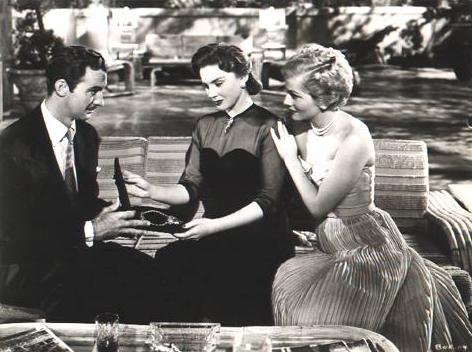Nicholas Ray’s Born to Be Bad is a great noir-inflected women’s picture, but in culling its background details for this article, I discovered that it was based on a book called All Kneeling, and the film’s failure to reuse that title instantly lowered it in my estimation. We could have had it all.
Born to Be Bad stars Joan Fontaine as Christabel Caine, a name that suggests her parents did indeed know she was born to be bad and decided just to lean into it. Christabel’s specialty, the movie gradually reveals, is faking sweetness and wide-eyed innocence while secretly–and often subtly–pulling strings to get exactly what she wants, whether that’s a party invitation or marriage to a wealthy man currently happily engaged to another woman. The film fills out its cast well with characters who respond to her act in different ways, from artist and society leech Gobby (Mel Ferrer) to the warm and sophisticated editor Donna (Joan Leslie) to the writer who is intrigued by Christabel’s hardheartedness (Robert Ryan). Christabel, a less ambitious and more clearly motivated Iago, comes into their midst and shakes everything up until it falls in her favor.
If this were a tragedy, Christabel’s tragic flaw would be that she’s led as much by emotion as by ambition. She lets at least one prize start to slip from her hand because once she has it, she can’t be bothered to put in the maintenance effort to make it seem like she still wants it. She needs to stay married to the rich, kind Curtis (Zachary Scott), but despite that, she dallies with writer Nick Bradley. He tells her that he’s the one she really loves, but the film seems decidedly unconvinced of that; it’s more likely that she’s just more attracted to him and he bores her less. Nick thinks he sees through Christabel’s machinations and loves her anyway–“I love you so much I wish I liked you”–but even he has a line, and as the movie progresses, he gets closer and closer to it. Born to Be Bad is the rise and fall of Christabel Caine’s perfect facade.
But what makes the film especially good is Ray’s cynicism. Christabel causes damage, some of which can’t be fixed, but ruining her name in New York doesn’t mean that she can’t just take her expensive fur coats and go to a different city and reinvent herself: this is America, where money will always talk. While the goodhearted Curtis and Donna get the most traditional happy ending, it’s Gobby who gets the ending itself.
And it’s Gobby who succeeds in being the most vivid character in the film. Gay, catty, and self-serving, he could easily be nothing but a stereotype–“My dear girl, apart from painting my major occupation is convincing women’s husbands that I’m harmless”–but Ferrer and Ray make him into something wry and eternal. He sees what Christabel is doing and allows her to cut a swathe through his social circle because, after all, there’s a chance it will benefit him… and at the end, he’s unpunished, trusted enough still to oversee Christabel’s departure and benefit from that, too. The movie ends with him delightedly marking up the price of Christabel’s portrait now that scandal has made it even more attractive. In the end, he’s not better than Christabel, he’s just wiser than she is. He knows to never do more harm than the people in power can live with, and that will keep him around forever.
Born to Be Bad is available on TCM Online.

